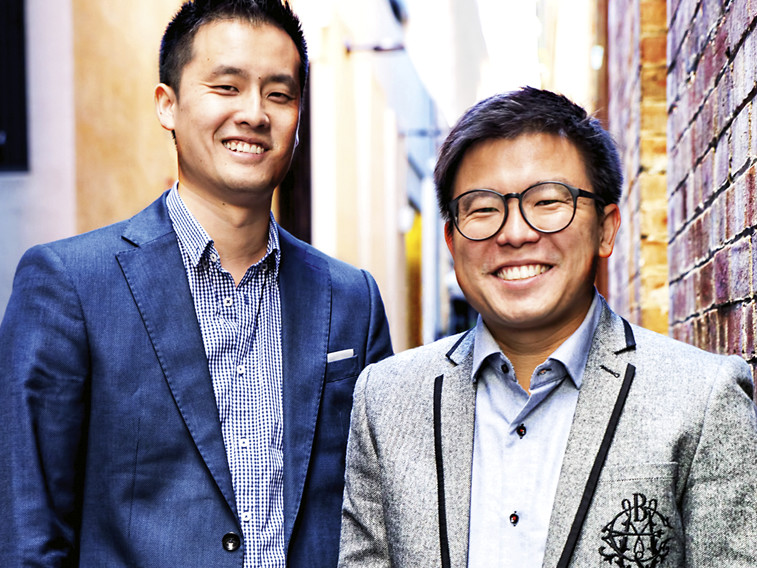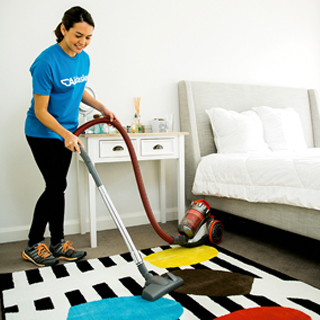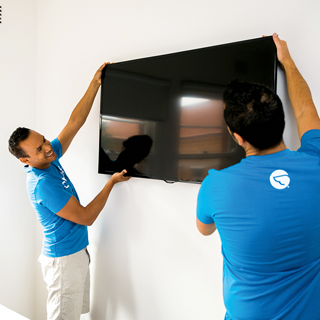Competition heats up for premium properties

Article
The gruelling task that moving house can be was the inspiration for the online marketplace startup that’s now grown to be a household name and is attracting big investment. Business View spoke to the co-founders of Airtasker, Tim Fung and Jonathan Lui, about their journey.

In June, Seven West Media led a funding round for Airtasker that raised $22 million. That brought the total amount of capital the company has raised since launching in 2012 to $32 million.1 Its co-founders, Tim Fung and Jonathan ‘Jono’ Lui, have certainly come a long way since the days when they were ferrying customers’ fast food orders around.
Tim Fung and Jonathan Lui met while studying at the University of New South Wales. It wasn’t surprising they were around the same age. However, they were amazed to discover how much else they had in common.
“We’ve both got two sisters. Tim’s father and both my parents are Hong Kong Chinese. We were both born and raised in Australia,” Lui says.
More importantly, while Fung studied marketing and Lui telecommunications, they were both ambitious and entrepreneurial. Post graduation, both went to work for prestigious corporations offering glittering career paths. But they soon resigned themselves to becoming the first hires at a scrappy startup.
“Tim was working at Macquarie Bank. He quit to be the first employee at Amaysim, the Australian telco founded in 2010 that now turns over more than $200 million a year,” says Lui. “Then he convinced me it was a great opportunity and that I should leave IBM and join the team, which soon grew to around 150 people. We both learnt an incredible amount from the five founders of Amaysim. Several of them are still our mentors to this day. We helped the Amaysim guys build their business up. Then, in late 2011, we resolved we would try to do the same thing they had.”
The now legendary Airtasker origin story involves the then 28-year-old Fung asking the then 27-year-old Lui, along with several of his other mates, to help him move house.
“We all agreed to help out but we kept saying, ‘We’re all busy. We’d prefer to just give you some money so you can pay someone to move all your stuff to your new flat’,” says Lui. “Tim and I thought, ‘Actually, that’s not a bad idea for
a business’.”
“We did some research and discovered nobody seemed to be offering anything like it in Australia. There was TaskRabbit, which had launched in 2008 in the United States, but it was operating more as a labour hire agency, effectively employing people then selling their services.
“We didn’t view that as a scalable proposition, at least not for people like us with limited access to capital. We decided to go with the marketplace model. People would post tasks on our platform and other people would bid on them.”
Starting an online marketplace may seem a logical enough business idea in 2016. However, as Lui points out, that wasn’t the case in a country that was then rather less focused on agility and innovation. “You have to remember that this was before startups became cool,” he says. “It was before anyone had heard of the sharing economy. There was only eBay. That’s how we sold our idea, as the eBay of tasks, where we’d take a 15 per cent cut of the transaction.”
Fung and Lui tapped friends and family for funds to turn the lights on at their new venture. They then found their Amaysim background allowed them, somewhat to their surprise, to secure $1.5 million early on.
“At that point Airtasker wasn’t much more than a PowerPoint presentation,” Lui laughs. “It was unheard of in those days to raise that kind of money. But there were some investors who knew us from our time at Amaysim. They chose to back us.”
Airtasker’s co-founders did pretty much everything in the early days. That included the tasks posted on their platform. “We’d be driving around Sydney at 2am, picking up KFC and delivering it to people’s houses,” Lui recalls. “That was good because it gave us an understanding of what the pain points were for people using Airtasker. It provided insights into how we could improve processes, make the experience smoother for both those posting and providing the task.”
Those insights were useful but they didn’t provide much help with the existential threat that soon confronted Airtasker. Lots of people had signed up to do small jobs but few were being posted. It wasn’t a surprising outcome given Airtasker was a new business with a limited marketing budget attempting to get people to do something they had no experience doing. Nonetheless, it led to what Fung views as an embarrassing and costly mistake. Lui prefers to remember it as a valuable learning experience.
Fung and Lui decided to abandon their original business model. They hit up large companies, including some run by personal friends, for work. Soon there were plenty of jobs coming in – such as huge letterbox drops for 
Most of the people doing the tasks – chiefly school and university students – were honest and hardworking. But not 100 per cent of them. Vetting all those entrusted with completing tasks was impossible. When, to take just one real-life example, boxes of pamphlets were discovered to have been thrown in a bin
rather than delivered, Fung and Lui were left to explain how that happened to angry clients threatening not to pay.
“It was a good learning for us,” Lui says. “We went from doing single food deliveries to co-ordinating the logistics for 40 people doing flyer drops across Australia. I saw it as an experiment. But, yes, it became clear we needed to get back to being eBay rather than trying to manage a retail store.
“Still it set us up to partner with large businesses later on in a way that didn’t involve Tim and I taking responsibility for ensuring tasks were completed satisfactorily.”
After its early misadventures, Airtasker acquired a couple of Australian competitors – Occasional Butler and TaskBox – that had launched around the same time. It entered into some lucrative partnerships with other ‘digital economy’ businesses, such as EatNow, DeliveryHero and UberX. It also joined forces with News Corp’s CareerOne, one of Australia’s biggest employment websites and part of Monster Worldwide Inc, the world’s largest job network.
“We now share the tasks advertised on Airtasker on the CareerOne site,” Lui says. “The people going on CareerOne are between jobs and looking to earn some money, so there’s an obvious synergy there.
“With the likes of EatNow or DeliveryHero, we can help supply the labour those companies need to, for example, provide merchandise to restaurants or deliver food. That sometimes involves us tweaking our offering. We may need to offer food delivery jobs at a set fee of $10 rather than have people bid on them.
“Nonetheless, it’s still the company and the person delivering the food interacting in that eBay-like way.”

“The first point I’d make is that we’re not supplanting an existing labour force,” he says. “What we’re doing is creating a whole new industry. A few years ago, you couldn’t get someone to come around to your house to change a light fitting or chase a possum out of your roof – not easily and at an affordable price anyway. Now you can.
“Secondly, there are a lot of people that find it difficult to access a conventional job. That can be because they’re an older person or an inexperienced, younger one. Airtasker provides a way for those people to be part of the workforce, to earn money and stay active.
“When we started Airtasker it was mainly school and uni students but now we get a lot of semi-retired people. Another interesting development is that Airtasker isn’t just something people do on a moonlighting basis anymore. There are a lot of people now working full-time hours doing tasks and making a good living out of it.”
Airtasker has also worked with insurance companies to minimise some of the issues that can crop up when either business owners or individual citizens hire independent contractors.
“Let’s say you engage someone through our platform to paint your lounge room or reception area and they knock over a can of paint, ruining your carpet,” Lui says. “Airtasker workers are covered for third-party liability. So the people using our platform know that if an accident happens – and they inevitably do sometimes – they are covered.
“We’re also liaising with insurance companies to develop income protection products for our workers. These kind of policies will ensure they’re not left in a difficult situation if they, say, fracture their wrist and are unable to complete any tasks for a couple of weeks.”
It’s been a while since Fung and Lui have had to deliver fried chicken or oversee leaflet deliveries. “We recently welcomed our 600,000th registered member,” Lui says.
“We’ve got about 35 staff. We’re seeing $45 million of transactions a year.”
In a sense, within four years of launching, Airtasker has succeeded in establishing itself as the 800-pound gorilla of Australian task marketplaces.
“Yes, it would be possible for a local company to launch a competing online marketplace. Or for one of the big foreign players to try to expand into Australia,” Lui says. “That’s not something we’re complacent about, which is why we’re always trying to stay two steps ahead of the game. However, we’ve developed a lot of intellectual property around how to make this kind of online marketplace work.
“We’ve assembled a great team. We’re building brand awareness. Plus we’ve got more than 200,000 reviews of people who’ve completed tasks. That helps people have peace of mind using our platform. They can know they’re hiring someone who has proven themselves to be responsible. Given all that, I think it gets a little harder for a competitor to come into the market.”
If the big players that have invested in Airtasker – Seven West Media, NRMA, Australian venture capital fund Exto Partners and Shanghai-based Morning Crest Capital – have their way, it will enter other online marketplaces of the world.
While Lui’s not about to show his hand about his company’s plans for world domination, he does admit the “blue-sky vision is to be a global business”. “Australia is a great market for us. It’s a wealthy country. It has a good mix of higher-income, time-poor people and underemployed but skilled people looking to earn extra income. That is not necessarily the situation in other parts of the world. Plus, if we expanded overseas there would be language and cultural barriers.
“We’d need to develop different services and features tailored to local markets. But none of those are insurmountable problems.
As you’d expect, we’re looking at the two markets everyone gets excited about – the US and Asia. The dream is to expand within the next few years.”
1 Kimmorley, S., “Airtasker just raised $22 million, and now it wants to become an Australian household name”, Business Insider Australia, 07.06.2016. businessinsider.com.au, visited 16.10.2016.
© National Australia Bank Limited. ABN 12 004 044 937 AFSL and Australian Credit Licence 230686.